In Paul,
screenwriters/actors Nick Frost and Simon Pegg crash the San Diego
Comic-Con, forever endear themselves to the fanboys, mark off some
of the talent they have on their “favorite stars to work with” list
and get the girl… or alien. It was inevitable that the Brit minds
behind Shaun of the Dead and Hot Fuzz would come up
with something that both exploits their cultural background and
wallows in it at the same time.
Take the story
they tell… Fanboys Graeme Willy (Pegg) and Clive Gollings (Frost)
hit the US for a road trip so they go to Comic-Con and visit various
UFO hotspots – Area 51, Roswell and others – where they happen to
run across Paul, the actual alien who crash-landed on Earth in 1947.
Then the adventures begin as they help Paul escape his captors – who
are chasing the intergalactic detainee to harvest him for his
transcendent powers.
Add into the
mix director Greg Mottola – who made both Superbad and
Adventureland – and Paul becomes a film that is not only
about aliens but pot-smoking as well. With this combo of talent on
hand, it would be enough to make this sci-fi comedy worth a viewing
– but then it also stars SNL vets Kristen Wiig, Bill Hader
and Joe LaTruglio, plus Jason Bateman and Sigourney Weaver – curious
star turns to say the least. And it has one of the funniest hero
performances on screen by Seth Rogen, going from one green guise to
the next.
How does
you feel
Paul compares to some of the other alien movies out now?
Simon Pegg:
I
think of all the alien films that have come out recently – and we do
seem to be a part of a zeitgeist of alien cinema – Paul is
probably the only one who would pass you a joint rather than shoot
you in the head. The others seem to be malignant and Paul is the
only one that’s benevolent.
If you
actually encountered an alien here on Earth what would you ask them?
Nick Frost:
I
would ask them what they eat and how they prepare it.
 Simon
Pegg:
He’s a keen chef. I guess I would enquire about the secrets of
interstellar travel. I mean they’d have to have overcome an extreme
hurdle to get here. That’s the thing. I think there’s definitely
life on other planets. There’s more chance of there being life than
not, but the thing is that we may never meet because of the
distances between our worlds are so enormous.
Simon
Pegg:
He’s a keen chef. I guess I would enquire about the secrets of
interstellar travel. I mean they’d have to have overcome an extreme
hurdle to get here. That’s the thing. I think there’s definitely
life on other planets. There’s more chance of there being life than
not, but the thing is that we may never meet because of the
distances between our worlds are so enormous.
Nick Frost:
Maybe he’s already here. Maybe he’s inside. If the ship landed, the
doors opened and like a shrimp it came out that wouldn’t be any
weirder than anything written by science fiction.
Prior to
penning the script you actually did a road trip throughout the
Southwest US and drew a lot of inspiration from that. Can you
encapsulate that trip and how did it inspire you?
Simon Pegg:
It was the single most important thing that we did prior to writing
the film, making the trip.
Nick Frost:
It’s the only thing we did, too.
Simon Pegg:
That’s true. We’ve traveled around America a lot. We’ve been to a
lot of places in America, but always we’ve gone airport to airport
and we’ve never driven. It’s not until you drive that you realize
just how enormous and breathtaking and beautiful and scary and
lonely and varied and extraordinary this country is. The fact that
it has so many people in it and you can still go an entire day and
not see a soul. A lot of what we experienced on the road in terms of
some of the people that we met, some of the adventures that we had,
went straight into the script. The only thing that didn’t happen to
us on that trip was meeting the alien. We made that up, I confess.
But a bird hit the window. We ran into some sort of scary hunter
types at The Little Ale-Inn [a pub].
Nick Frost:
We were the only people in The Little Ale-Inn before they arrived
and we were being quite boisterous like we owned the place and then
these two guys walked in who looked to be very serious men with kind
of hunting suits on. We got quite quiet and went, “Come on, lets
just go.”
Simon Pegg:
An atmosphere descended on the place, and so, yeah, that was
important. When I look back on it now I think, “It’s amazing that we
actually considered writing the film without doing that.”
Nick Frost:
Originally, we were going to sit, or I think for the first few
hours, we sat a little table in the RV and tried to write things and
we suddenly became very aware that that was ridiculous. What we
needed to do was sit and watch America drift by.
Simon Pegg:
Look out the window.
There’s a
lot of road trip in science fiction.
Star Wars is a road trip. Star Trek is a road trip. So are
Lost in Space, Fantastic Voyage and on and on. When you look
at the science fiction genre, it is usually a road trip movie or has
that component in there somewhere.
Simon Pegg:
I guess that it’s a journey into the future itself. The very nature
of science fiction is about pioneering into a time that we don’t yet
know or a technology that we don’t yet know. In that respect it has
the momentum of a journey. So, yeah, it is. It’s about uncharted
territory and that’s what the road trip is all about: the voyage of
discovery. So in that respect, yeah. It’s a metaphor for travel, I
guess, science fiction. It’s a metaphor for forward movement,
forward momentum. For us, it was about wanting to make Easy Rider
and put an alien in it. That was it. The agreement was to make
Greg’s [Mottola] first film Daytrippers, but instead of Liev
Schreiber we’d have ET.
Nick Frost:
Kevin Costner out of Fandango. That’s what we wanted to do, I
think.
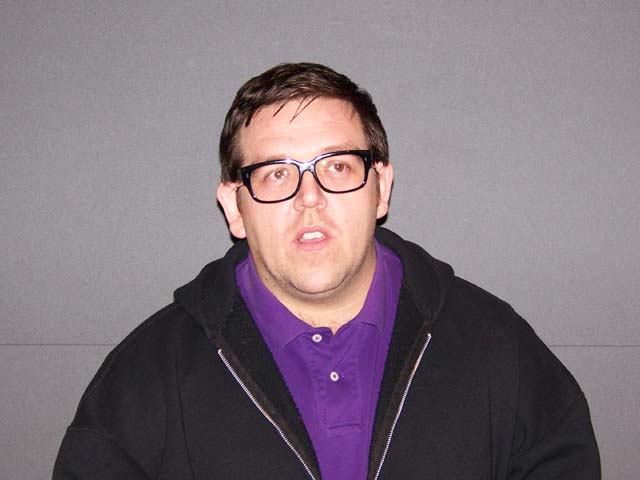 And
shoot somewhere that has nice weather since you’re from England...
And
shoot somewhere that has nice weather since you’re from England...
Nick Frost:
Yeah.
Simon Pegg:
But for some reason we went to New Mexico.
Nick Frost:
New Mexico has one of the highest incidences of lightning death in
the States.
Simon Pegg:
Although, having said that, we fell in love with that place and we
were completely enchanted by Santa Fe and New Mexico. It’s a very
spiritual place and we ended up being slightly dreamcatcher-y about
it.
There are
so many references in the film. How did you go about figuring out
what references you were going to put in there, what tributes? And
were they based on your favorite films – what are those?
Simon Pegg:
It’s more organic than that. We didn’t have a checklist of films
that we wanted to name. Obviously, we’re appealing to our love of
Close Encounters and ET, but we didn’t really set out to
make any references. It’s just that that’s our frame of reference
culturally. We grew up on cinema and television and that is what we
defer to for our metaphors in life, those touchstones. So, the
cantina band music in the roadhouse was Greg’s idea, and it was
entirely like, we’re in a situation where strangers are going into a
bar which is a bit unnerving and the first thing that springs to
mind is that scene in Star Wars. So we had the Dixie Band
play the cantina band music.
Nick Frost:
And with Sigourney, as well. I mean, you’ve got Sigourney Weaver
[star of Alien] onboard and I think we all three had that
conversation, like, “Well, lets see if we can get it in somewhere
where she says, ‘Get away from her, you bitch.’” She was amazing. In
particular, we were up in the ski basin in Santa Fe, the three of us
and Blythe [Danner] and Sigourney. We’re all standing around and
Sigourney was giving Blythe a line reading about how to do it, and I
think that for all three of us that’s one of those moments that you
think, “What an amazing job we’ve got.”
Simon Pegg:
Then Sigourney had started telling a story about how James Cameron
had only given her one take at that moment. So that “Get away from
her, you bitch” you’ve seen in Aliens was the one time that
she got to do it because she was like, “I could’ve done it
differently.” And we were like, “What?!” That’s like the most iconic
delivery of a line in cinema history.
Nick Frost:
I think as well as us putting references into the script there are
also other references that he leaves his lovely imprint and his
homages to [Steven] Spielberg and Duel.
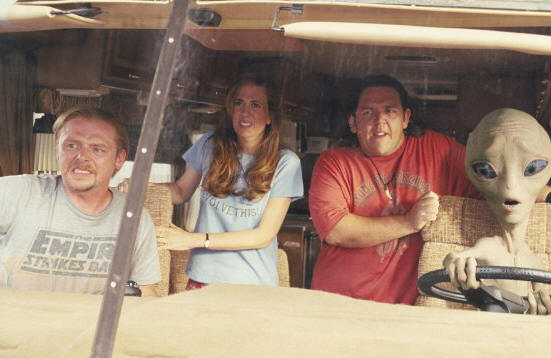 How
did that scene where Paul eats a live bird come about?
How
did that scene where Paul eats a live bird come about?
Nick Frost:
With Paul eating the live bird, again, working with the idea that
Paul has been around and perhaps helping the film industry and
television industry for the last 20 or 30 years, it was our chance
to get to reference to V. In V when you see, is it
Robert Englund…
Simon Pegg:
It’s that woman, isn’t it?
Nick Frost:
Yes. So you see her eating a dead bird it’s because Paul eats birds.
It was a little reference to V.
Simon Pegg:
Also, he brings it back to life. We wanted the majesty of his
healing powers to be wondrous and then he just suddenly eats it. We
loved the idea of him eating a dead bird is horrible. Then
immediately you think, “Yeah, he’s right,” and then you go, “Hang
on. We eat chicken all the time. Of course we eat dead birds.” That
was the joke. We had Paul having this wondrous moment of using his
resurrection powers and then suddenly he just eats it.
Nick Frost:
What’s also funny is when you write that you just think, “Oh, that’s
easy. We’ll just shoot it and that’ll be that,” but when you come to
film that kind of thing and you work out that there are laws here
that you cannot show an indigenous bird being eaten you have to find
a bird that’s not indigenous to the States. What did we use? I think
we used a Dutch starling. Something weird like that.
At the end
of this film Paul seems to be the most human of all the characters.
helping everyone to be better humans…
Simon Pegg:
The joke of the film is that the least alien person in the movie is
the alien. He’s the most at ease with himself. He’s the most
relaxed, the most well adjusted, the smartest guy – and he’s the
alien. Graeme and Clive are the aliens. They’re the ones that have
come over from a different land into this different world. Ruth is
an alien in that she’s lived this very cloistered life and suddenly
the universe has opened up to her. Everybody is in some way alien
and Paul is the catalyst that helps them come to terms with that. We
just thought that was a really interesting idea, that our alien hero
was actually more human than they were. He’s like a cross between ET
and Bill Hicks.
Nick Frost:
I like that.
In the film
and the script there’s a strong emphasis on Darwinism over
creationism and how closed-minded Kristen Wiig’s character Ruth is
at first. Why was that important to emphasize?
Simon Pegg:
It’s mainly because we were interested comedically in the idea of
someone having their world view altered completely. In order to do
that we had to have Ruth’s particular faith be at the very extreme
end of Christianity, the literal interpretation of the bible because
by Paul’s very appearance that is then called into question and that
opens up the whole comedy of her trying to swear. We’re not trying
to tell anyone how to think. I grew up in a cathedral school. I had
religious people around me as a kid. They all had great senses of
humor. We’d like to assume that everyone has a sense of humor and
comedy is an arena where you can rehearse ideas that might not be
comfortable to you in the real world. It’s like a roller coaster.
You can experience fear and know you’re not going to do die. This is
a really interesting idea. If an alien came down to earth all of us
would have to question what we believe about the universe because
Paul has his creation stories as well. I’m sure that his people have
their creation stories.
Nick Frost:
That’s not something that we did lightly as we were writing. We had
to think about this and take it seriously and not be flippant about
it. Then as writers, if you start to censor yourself about certain
things then where does that stop? I think it’s more insulting to
Christians to imagine that they wouldn’t have a sense of humor.
Simon Pegg:
Everything has to be on the table comedically, as well. As long as
you’re in a position to talk about it, like, if you’ve experienced
it, it should be joked about. If there is a God and he did create us
he sure as hell gave us a sense of humor. So it’s an insult to him
not to use it.
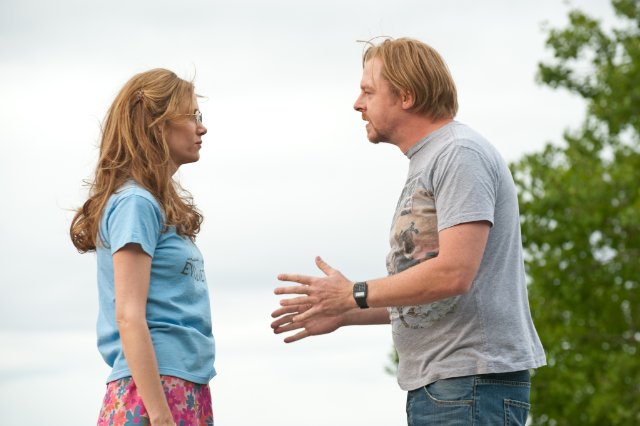 What
did you have in mind putting the sexual tension into the movie?
What
did you have in mind putting the sexual tension into the movie?
Nick Frost:
Did you say sexual tension? I guess you felt that sexual tension.
Simon Pegg:
It’s funny that Graeme and Clive were almost like a married couple.
They’re very codependent and I think that Ruth and Paul present
themselves as threats because Clive is very jealous of Graeme’s
relationship with Paul at first. They finally break the ice together
and share a cigarette because they go through that very physical
moment when Paul gives Clive his knowledge.
Nick Frost:
It’s something that we’ve done in the past as well, as mates. Like,
if he talks about a girl which means that I get moody about it, just
joking and then he does the same.
Simon Pegg:
I have friends that Nick, if I talk about them, then Nick gets angry
and it’s similar. There’s some guy that Nick hangs out with called
Danny and I’m sick of hearing about him.
Nick Frost:
He’s just a mate...
Simon Pegg:
He’s not. He’s more than a friend. I just don’t like him.
Nick Frost:
You’d like him. He’s cool. He does things that you won’t do.
You guys
are aliens yourselves in a way, whether in this movie or in real
life as Brits and how you’ve coordinated the clash of the British
and the American sense of humor?
Nick Frost:
There is a percentage of Graeme and Clive in all of us. Even though
we’re not the nerdiest, geekiest people in the world – we call them
normal sometimes – if regular people could hear us, it’d really be
like that thing of, “What are they saying? What language are they
speaking?”
Simon Pegg:
We do have big, nerdy elements to our characters and we do love our
science fiction but we’re not quite as low functioning as Graeme and
Clive are at first because they literally live in their own
world. But in some respects I think we’ve taken our experiences in
coming over here to America and working and doing our press tours
and meeting people over here, we’ve taken those experiences and put
them into Paul. Sometimes it’s easier to forget that we’re
foreigners. We speak the same language and so we just have this
natural feeling like we’re related or that Britain is an extension
of America in some way. It’s not. We’re different countries and we
are foreigners here. Sometimes we feel extremely integrated and
sometimes we don’t. Sometimes we feel, God, they really think we’re
foreign. I remember when we were in Austin once and were having
breakfast. Nick asked the waiter for some “buh’er” and the waiter
said, “Pardon me?” Nick said, “Can I get some buh’er for my toast
here?” “What?” Then Nick had to go, “Butter.”
Nick Frost:
He’s talking about the differences in languages, but tuna, trying to
order a piece of tuna or a tuna fish sandwich is like, “What?” and
you actually have to say, “Tuuunna.” There are points where you do
go, “Oh, we’re different. We’re in a foreign country.”
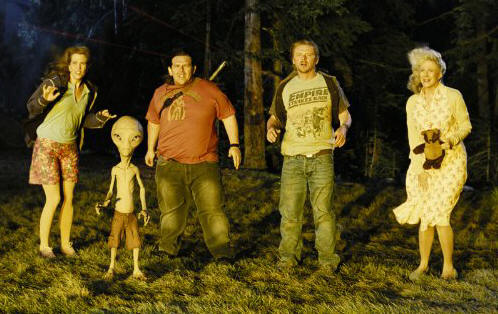 Simon
Pegg:
From that I think we extrapolate the fact that we are very lucky in
the United Kingdom because we have this huge annex of potential in
America and that we can show our stuff to you because you understand
it. There are great movies that come out of France, Sweden, Spain,
Germany, Belgium, Finland, Scandinavia that don’t really get seen
over here because of the subtitles thing and because people are less
likely to want to read a film than to watch it. We have that huge
potential here whereby our films are considered for the Oscars and
yet they’re still foreign films. The King’s Speech is a
foreign film. It should’ve been in the Foreign Film category, but
it’s not. It won the Best Picture, for better or for worse. So we’re
very lucky in that respect and it enables us to make a film like
Paul and share our sense of humor with you – and our senses of
humor aren’t all that different. We find the same things funny.
There are tiny differences in the way that we use humor. Socially, I
think that British people tend to be a little dryer just because
we’re a little more ashamed of ourselves than you guys are.
Simon
Pegg:
From that I think we extrapolate the fact that we are very lucky in
the United Kingdom because we have this huge annex of potential in
America and that we can show our stuff to you because you understand
it. There are great movies that come out of France, Sweden, Spain,
Germany, Belgium, Finland, Scandinavia that don’t really get seen
over here because of the subtitles thing and because people are less
likely to want to read a film than to watch it. We have that huge
potential here whereby our films are considered for the Oscars and
yet they’re still foreign films. The King’s Speech is a
foreign film. It should’ve been in the Foreign Film category, but
it’s not. It won the Best Picture, for better or for worse. So we’re
very lucky in that respect and it enables us to make a film like
Paul and share our sense of humor with you – and our senses of
humor aren’t all that different. We find the same things funny.
There are tiny differences in the way that we use humor. Socially, I
think that British people tend to be a little dryer just because
we’re a little more ashamed of ourselves than you guys are.
Nick Frost:
We’re ashamed of our emotions.
Simon Pegg:
We’re ashamed of our emotions and you guys are much more prone to
emoting and not being frightened of that. You clap louder. You cheer
louder. You cry more. You laugh louder. We’re like, “I’m afraid that
everyone you know is dead.” “Oh, Okay.”
Nick Frost:
“Oh, well. Onwards and upwards, I say.”
Simon Pegg:
On chat shows here, if you mention that, “I was going through Idaho
the other day,” there’s someone who will go [loudly], “Well, yeah
I’ve seen Idaho on a map!” Whereas I’ll see Americans on British
chat shows and they’ll say something and look to the audience like,
“Why aren’t they clapping? I just mentioned the place name.” But
it’s because we have different approaches to our emotions. I love
the openness of America. I’d much prefer to watch a film with an
American audience because they’re more collaborative.
Nick Frost:
When we watched the premiere for Paul there were a couple of
beats where we thought, “Ah, this is going to get a big cheer, a big
laugh,” and there was nothing at all. I was sitting next to someone
and I said to them: “America will like it more.” There are certain
jokes that are for American audiences primarily.
Simon Pegg:
That’s the only difference, I think. You see that in Graeme and
Clive… the way that they are responding to Paul is very restrained
and they learn to open up. Paul teaches them to be not just more
human, but, more American as well.
Nick Frost:
To talk about the second point about the American cast. We have a
giant wish list of people that we want to work with. Because of
Shaun of the Dead and Hot Fuzz and Greg and Superbad
that gives you a little calling card which means potentially now
people who we really want to work with will maybe get our script. It
won’t just get to their agent and be binned or shredded. So it’s
nice to have a wish list of the best people you can possibly have
and we were very lucky to get them and have an opportunity to work
with Americans.
Simon Pegg:
We ticked off a large portion of that wish list with this film,
particularly with Jason [Bateman], Bill [Hader], Kristen, Joe [Lo
Truglio] in terms of the comedic… and Seth [Rogen]. I can honestly
say that I forget Seth’s in the film because I just see Paul now. I
genuinely forget that Seth is in the movie. He did such an amazing
job with his character. I was coming back from the premiere in
London and I was sitting in the car thinking about everybody and
thinking how amazing it was that we’d finally got there and had our
premiere. I was thinking, “Who did I miss tonight? Someone wasn’t
there that I really wanted to see and speak to? Oh, it was Paul,”
and he’s never existed.
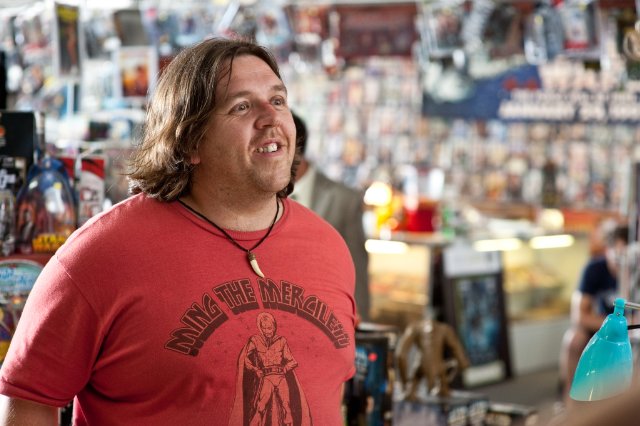 Nick
Frost:
Also it’s a challenge to have this kind of talent like John Carroll
Lynch. It’s like, “That’s John Carroll Lynch.” What an amazing
actor. There were lots of times that me and Simon would go off into
a little corner and say, “We have to start bringing the heat or else
we’re very in trouble.” You have to bring your A game. So working
with these people is a real challenge and it was a real challenge to
us to be good and to not sit back and think, well, lets not sit back
and do the same old – excuse my language – shit that we did in
Shaun of the Dead and Hot Fuzz. It keeps you on your toes
and I think that’s important, not just in film, but in life, to
challenge yourself and to move forward and not stay the same.
Nick
Frost:
Also it’s a challenge to have this kind of talent like John Carroll
Lynch. It’s like, “That’s John Carroll Lynch.” What an amazing
actor. There were lots of times that me and Simon would go off into
a little corner and say, “We have to start bringing the heat or else
we’re very in trouble.” You have to bring your A game. So working
with these people is a real challenge and it was a real challenge to
us to be good and to not sit back and think, well, lets not sit back
and do the same old – excuse my language – shit that we did in
Shaun of the Dead and Hot Fuzz. It keeps you on your toes
and I think that’s important, not just in film, but in life, to
challenge yourself and to move forward and not stay the same.
Spielberg
was mentioned earlier. Simon, can you talk about working with him
and do you plan on screening this film for him at some point?
Simon Pegg:
Well, both Nick and I worked on Tintin because Nick and I
play the Thompson Twins, almost identical detectives.
Nick Frost:
It’s going to be the first time ever that we weigh the same.
Simon Pegg:
Albeit in the performance capture world, which is an amazing
technology and was great to work with that, but not only that. Also,
with Steven. In making Tintin that we talked about Paul
with him. I showed him a picture on my phone of us with the ET, with
the alien head bust that we took on our road trip with us and he
goes, “Wait. What is that?” I said, “We’re making this movie about
this alien called Paul who you’ve had a direct hotline to over the
years and he gave you the idea for ET and Close Encounters,”
and he’s like, “I love that.” He started riffing on the idea and he
said, “Maybe I could be in the film. Maybe I could do like a
[cameo],” and we were like, “Did you just say that?” Then we really
started to laugh at the idea of Steven Spielberg literally phoning
in a cameo. So I emailed him a little later and I said, “You
remember that thing you said to us? You did say it because we taped
it and legally you’re obliged to go through with it,” and he’s the
coolest guy. He loves making films. He liked the idea. Of course he
will see it because he’s very much a part of it, not least because
it’s a tribute to him, but because he’s in it.
When do you
think he’ll see it?
Simon Pegg:
Well, if he’s around next week for the premiere then hopefully he’ll
come to that.
Nick Frost:
It is quite nerve racking.
Simon Pegg:
When Greg had to direct him he forgot to say action. Steven was at
the mike going, “Can I start?”
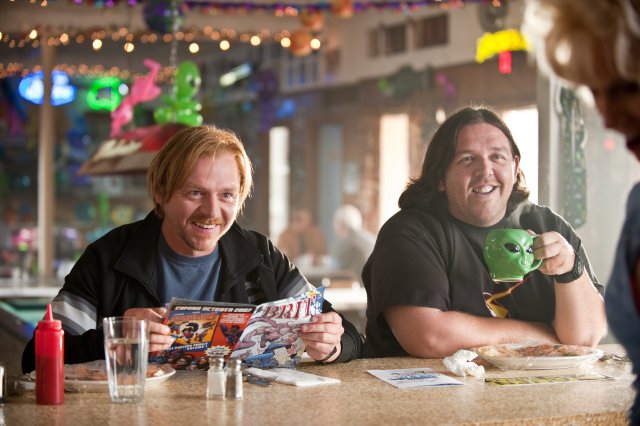 Simon,
are you going to be doing the sequel to
Star Trek and what about the Mission: Impossible film?
Simon,
are you going to be doing the sequel to
Star Trek and what about the Mission: Impossible film?
Simon Pegg:
All I know about Star Trek is that it’s being written and
they’re very happy with how that’s going. I think there’s a lot of
excitement at Bad Robot about the forthcoming script, but I know
nothing of it. I’m just about to finish Mission: Impossible.
When is
At World’s End coming out? Does it depend on what Edgar Wright
[director and co-writer of Shaun of the Dead and Hot Fuzz]
directs next?
Simon Pegg:
I think that At World’s End was the Pirates of the
Caribbean sequel that came out a few years ago. I don’t know. Me
and Edgar are going to try to get together and write our third
thing. Whether or not it’s called that I don’t know, as soon as we
can, basically. Edgar is now finished with his Scott Pilgrim
promotion. As we speak, he’s just finished promoting in Japan. He’s
going to have some time, and hopefully after Mission: Impossible,
I’ll have some time, so that we can sit down and get the ball
rolling and hopefully turn it over slightly quicker than
normal. We’ve written two films together now. So this should not
take as long as Shaun and Hot Fuzz did. Of course Nick
will be involved from the beginning. It’s just a question of
logistics, practicality and timing, but we’re so ready to do it.
CLICK
HERE TO SEE WHAT NICK FROST HAD TO SAY TO US IN 2007!